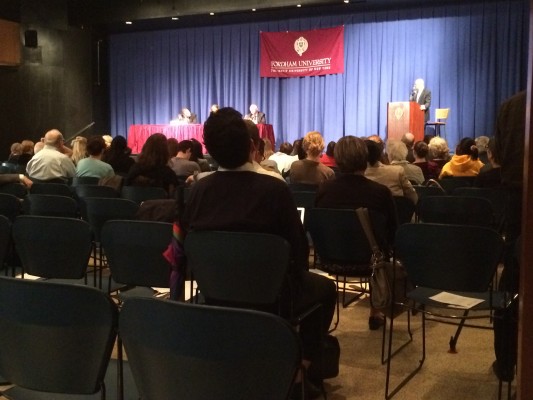Guest Speakers Discuss Immigration Policy
September 18, 2014
On Wednesday, Sept. 16, Ken Salazar the former Secretary of the Interior, Sarah Burr an immigration judge, and Gabriel Salguero, president of the National Latino Evangelical Coalition convened in Pope Auditorium at Fordham College at Lincoln Center (FCLC). to discuss America’s responsibility, if any, to the current border crisis. The discussion was called, “A Crisis of Conscience: What Do We Owe Immigrant Youth and Families?”.
According to USA Today, there are more than 50,000 children detained all around the United States. These children fled to from countries such as El Salvador, Guatemala and Honduras to escape the violence and strife caused by gang and drug warfare. With these children sitting and waiting to know what their future holds, the United States faces a major civil rights challenge.
According to the United States Conference of Catholic Bishops (USCCB) on the principles of Catholic Social Teaching, the first principle states that people have the right to migrate and sustain their lives and the lives of their families. In dealing with the border crisis and immigration, this becomes a delicate issue that has no clear-cut answer.
Maureen Tilley, a theology professor, believes, “We need to balance good things. There’s the good of respecting the life of the person that’s coming [to the U.S.], and there’s the good of respecting the lives of the people who are already here. How do we balance this?”
Tilley’s thoughts are consistent with the second principle Catholic Social Teaching, which according to the USCCB, states that a country has the right to regulate its borders and control immigration. While ideally, the Catholic Church would support any of the immigrants coming in, realistically, the issue also has to take into account the U.S. and how it would affect the country.
To further debate this issue, Ken Salazar the former Secretary of the Interior, Sarah Burr an immigration judge, and Gabriel Salguero, president of the National Latino Evangelical Coalition, convened in Pope Auditorium and discussed what Americans owe immigrants.
Ken Salazar labeled current events as a “time of shame” for the U.S., especially due to the drawn out process of immigration reform. He described the current immigration dilemma as one of the most pressing civil rights issues of our era. The immigration crisis was compared to the current battle for women’s and civil rights. According to Salazar “we have a long way to go” before the border crisis is solved.
Sarah Burr discussed that the children need the due process of the law and “fundamental fairness.” Burr explained that the government does not have to appoint legal representation to the immigrant children because immigration is a civil rights case, not a criminal case. Many juveniles are being sent to civil courts without any legal representation. Burr wants free counsel for all children involved in the crisis.
“We are judged by how we treat the weakest among us,” she said.
Despite the economic cost of fair treatment Salguero added, “The morally correct action always outweighs the economically correct action to those who uphold a strong moral code.”
He also stated that a commission headed by Condoleezza Rice found that proper immigration reform would help add a billion dollars to the economy. According to Salguero, not only is immigration reform the morally correct choice it is also the economically correct choice.
He continued, “You might ask yourself, where are the Evangelicals on this issue?… The National Association of Evangelicals has signed a public document saying we want a comprehensive immigration reform that ensures family security.” According to the Washington Post, Evangelicals are the most skeptical about immigration reform out of all major American religious groups. The National Association of Evangelicals’ advocacy shows a change in the attitude towards a comprehensive immigration reform.
Salguero went on to say, “We cannot say we value families and then deport parents to another part of the world. It is at best, inconsistent and at worst, hypocritical.”










